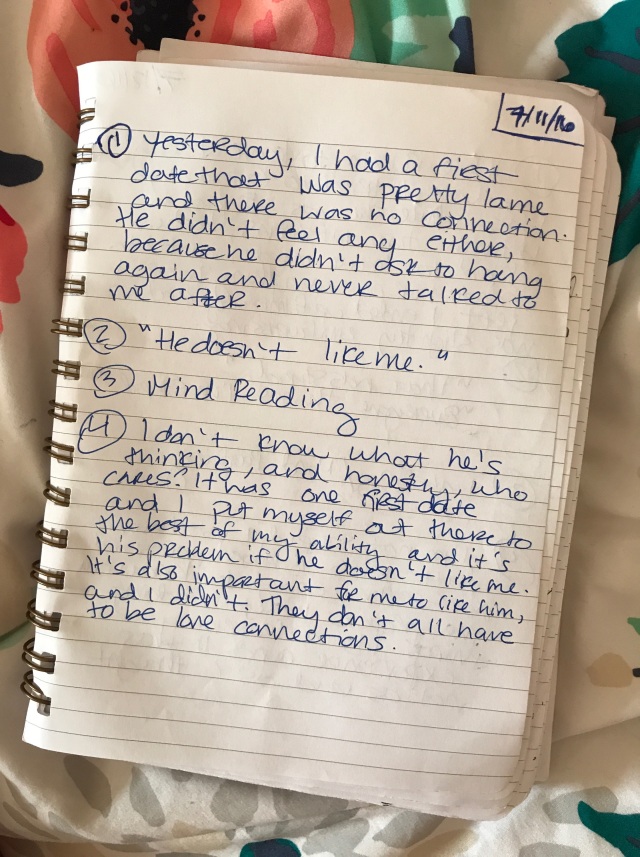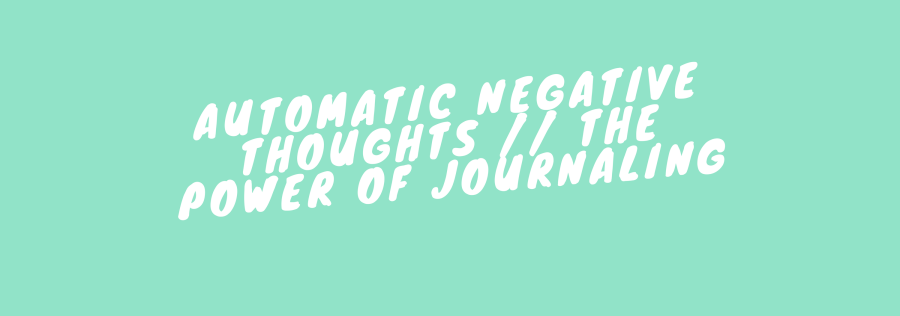Since I was making up stories as a kindergartner, writing has always been my outlet. When I started therapy, my therapist began to realize just how essential it was to my life, and how it could be not only a form of expression, but emotional. Cathartic.
She suggested I buy a small journal just for my ANTs, which are Automatic Negative Thoughts. These thoughts are cynical, irrational and come through our brains all by themselves. We experience them every minute of every day of our lives, and for the first time in a long while, I was taught how to combat them head on. Writing in this journal made me realize just how important thoughts are. They can either help or hurt you. If the irrational ones are left unnoticed, they can start to affect relationships, work, and your entire life. First, we need to notice them. If we catch them the moment they occur, we chip away at their power.
When a negative thought goes unchallenged, your mind believes it and your body reacts to it.
For example, if I would walk into work, sit down, and my boss wouldn’t say good morning, my brain automatically thinks, she’s angry with me, or I’ve done something wrong. These are negative thoughts that need to be confronted with reality. Whenever thoughts like these would cross my mind, I would stop and write it in my ANT journal – didn’t matter where I was. I literally brought it everywhere. First date, out with friends, a concert – you name it.
Here’s an example of the ANT form:
Step 1: Event – Write out the event that is associated with your thoughts and feelings.
Step 2: ANT – Write out the Automatic Negative Thought.
A few examples of typical ANTs are:
“You never listen to me.”
“You don’t like me.”
“This situation isn’t going to work out. I know something bad will happen.”
“This is stupid.”
“He doesn’t want to talk to me.”
“I should have done better. I’m a failure.”
Step 3: Species – Identify the type of irrational thought.
Here are the different labels for ANTs:
“Always or never” thinking: thinking in words like always, never, no one, every one, every time, everything
Focusing on the negative: only seeing the bad in a situation
Fortune telling: predicting the worst possible outcome in a situation
Mind reading: believing that you know what another person is thinking, even though they haven’t told you
Thinking with your feelings: believing negative feelings without ever questioning them
Guilt beatings: thinking in words like “should, must, ought or have to”
Labeling: attaching a negative label to yourself or to someone else
Personalization: innocuous events are taken to have personal meaning
Blame: blaming someone else for your own problems
Step 4: Kill the ANT – Talk back to the irrational thoughts.
Now, here’s an example of a real-life ANT being written down and corrected. This is one from my very own ANT journal:

How you think moment by moment matters. It plays a large role in how you feel, behave, and the way in which your life turns out. Negative thoughts can cause you to feel internal discomfort or pain, leading you to behave in ways that alienate others. Hopeful thoughts can influence positive behaviors and lead people to feel good about themselves and be more productive in the day to day.
Listen, I’m not saying that we should just snap our fingers and wash away all the negative thoughts because that’s just unrealistic. I’m saying that these automatic negative thoughts are completely irrational. The ones that seep into our minds and convince us we are failures, pathetic, and that everything is our fault – that no one wants us around, everyone thinks we are too much. Do they though? Is that reality? Nope, it’s not. It’s time to fight against that for a stronger way of thinking.
Honestly, at first I thought writing these thoughts down was a little dumb. I didn’t think it was helping me but a year and a half later – I don’t even need to write it down anymore to correct my thoughts, and that’s exactly what my therapist intended. Since I’ve written it down time after time, whenever I have one of these thoughts, I do these four steps in my head in a matter of seconds. It takes a lot of practice to get to that level, but it’s so worth it.
Whenever I noticed an ANT entering my mind, I trained myself to recognize it and write it down. When we write down our negative thoughts and talk back to them, we start to take away their power and gain control over our mood. Kill the ANT by feeding our emotional anteater.
Whenever we need to be in control of our mind – times when we’re feeling anxious, depressed or frazzled – it’s essential to turn to something that works. I allowed these negative thoughts to control every mood I had, every friendship I was in, and basically every relationship. It’s time to stop giving these thoughts any more power. Don’t believe everything you hear, even in your own mind.
Do you use the ANT journaling method? How does it work for you?


I LOVE Dr. Daniel Amen’s approach to fighting against your ANTS! Great encouragement ❤
LikeLiked by 1 person
Yes! It’s so great – a real lifesaver for my own mental health. Glad to hear you appreciate it as well, thanks for the comment!
LikeLiked by 1 person
Great post! ❤ Thank you XXX
LikeLiked by 1 person
Thank you for the comment! I’m glad to hear you resonated with it 💕
LikeLike
This is gold! Thanks for this!
LikeLiked by 2 people
Thank you, I’m glad to hear it resonated with you 🙂
LikeLiked by 1 person
Very insightful read! Thank so much for sharing this – I’ll definitely be taking this on board! XX
LikeLiked by 1 person
Aw thank you! It’s a great tool to have, thanks for your wonderful comment 🙂
LikeLike